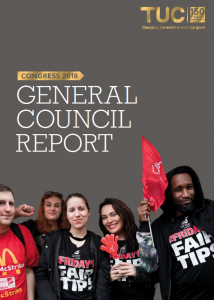In her latest climate blog for Labour CND, Sam Mason takes issue with the GMB composite at the forthcoming Trades Union Congress arguing true solidarity with our sisters and brothers across the world means public investment in socially useful production not more weapons of mass destruction
In 2007, Nicholas Stern made this much referenced quote:
“Climate change is a result of the greatest market failure the world has seen. The evidence on the seriousness of the risks from inaction or delayed action is now overwhelming. We risk damages on a scale larger than the two world wars of the last century. The problem is global and the response must be a collaboration on a global scale.”
THIS DEFINITION of “market failure” is said to stem from free markets failing to maximise society’s welfare. Something which we are witnessing to catastrophic ends in the respective energy and climate crises. Evidence if it was ever needed, free market economics and the privatisation it walks hand in hand with are not the best way to address the global challenges facing us. This includes climate change but also increasing inequality, public health, diminishing social protections, decent unionised work and threats of war and nuclear conflict.
One area which remains free of the market mantra is defence spending, however. Of course, private sector companies benefit from this but it is through the investment of public money, and for ends that do nothing to meet the needs of workers and people, here in the UK or globally. Something well understood by the former Lucas Aerospace Shop Stewards committee in developing their Alternative Corporate plan for socially useful production in the 1970’s.
The GMB notion, misleadingly entitled economic recovery and manufacturing jobs, is an agenda for warmongering and nuclear weapons
WHILE THE IDEAS of worker’s plans as espoused by the Lucas shop stewards have gained some traction in recent times across the labour and climate movements, unfortunately some industrial unions are still pinning job creation plans to the mast of defence spending. The GMB motion to be debated at the postponed TUC Congress in October under the misleading title of “economic recovery and manufacturing jobs”, is an agenda for warmongering and nuclear weapons, taking us in completely the wrong direction.
Contrary to what the motion says, a lack of investment in defence spending is not the reason for our lack of funding in our public services. The proposals in this motion would further reduce vital monies for these as well as investment in renewable energy, urgently needed retrofit and insulation of our homes and, essentially the creation of many more jobs including in the defence ‘company’ towns of Barrow.
WE HAVE JUST SEEN devastating of floods in Pakistan, said to be one of the “worst climate change-induced catastrophes ever recorded globally”. Pakistan contributes less than 1% to global greenhouse gas emissions, and rightly this ‘event’ has refocused debate on the responsibility of the global north around reparations and loss and damage.
However, Pakistan is also a heavy IMF indebted nation and nuclear weapons state. None of which helped avert this recent catastrophe or will assist in the post flooding crisis of food shortages, displacement, destruction of livelihoods and health risks.
IF THE GMB MOTION PASSES at the TUC, this will be a catastrophic failure of the labour movement towards the global south. To show true solidarity with our sisters and brothers across the world, it’s time we reassessed our own transition. This includes support for debt cancellation, and a programme of global public investment in socially useful production, rather than collaborating in more weapons of mass destruction.





